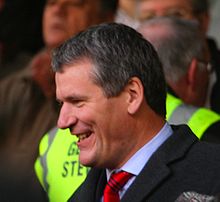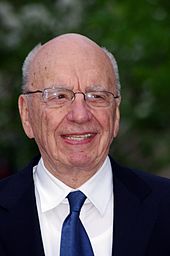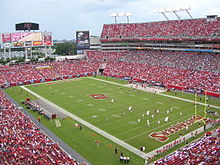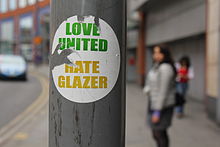- Glazer ownership of Manchester United
-
Manchester United Football Club is an English football club based in Old Trafford, Greater Manchester. The club was formed as Newton Heath LYR Football Club, the works team of the Lancashire and Yorkshire Railway depot in Newton Heath, in 1878. The club split from the railway company in 1892 and remained under private ownership for almost 100 years, changing its name to Manchester United after a brush with bankruptcy in 1902.
The club went public in 1990 and was the subject of takeover bids from property trader Michael Knighton and Rupert Murdoch's BSkyB corporation before Malcolm Glazer's stake was announced in September 2003. By the end of the year, Glazer had increased his shareholding from 3.17% to around 15%, which he almost doubled in the year up to October 2004. His acquisition of John Magnier and J. P. McManus' 28.7% stake in May 2005 pushed his own up to around 57%, well over the 30% threshold that would force him to launch a takeover bid. A few days later, he took control of 75% of the club's shares, allowing him to delist from the stock exchange, and within a month, Glazer took 98% ownership of the club via his Red Football parent company, forcing a compulsory buy-out of the remaining 2%. The total purchase of the club totalled almost £800 million.
The majority of the cash used by Glazer to purchase Manchester United came in the form of loans, much of which were secured against the club's assets, incurring interest payments of over £60 million per annum. The remainder came in the form of PIK loans (payment in kind loans), which were later sold to hedge funds. Manchester United is not liable for the PIKs. The PIKs are held by Red Football Joint Venture Ltd and are secured on that company's shares in Red Football Ltd (and thus the club). If they are not repaid by 2017, the Glazers will almost certainly lose all their shares in Red Football Ltd (and the club) to hedge funds. The interest on these loans rolls up at 14.25% per annum. Despite this, the Glazers did not pay down any of the PIK loans in the first five years they owned the club. In January 2010, the club carried out a successful £500 million bond issue, and as of March 2010, the PIKs stood at around £207 million.[1]
Manchester United fans opposed Glazer's takeover of the club, particularly once they realised the level of debt that the club would have to take on after having been debt-free for so many years. Since 2005, the Manchester United Supporters' Trust has been working on a way of returning ownership of the club to supporters; in 2010, they met with a group of wealthy Manchester United fans – dubbed the "Red Knights" – to discuss a billion-pound takeover bid.
Contents
Background
Manchester United was the subject of a takeover bid from Rupert Murdoch's BSkyB corporation in 1998.
Manchester United was formed as Newton Heath L&YR F.C. in 1878 by the workers in the Carriage and Wagon Works of the Lancashire and Yorkshire Railway's Newton Heath depot. In 1901, the club was in over £2,500 of debt and facing a winding-up order; however, they were saved by local brewer John Henry Davies, who changed their name to Manchester United in 1902. After Davies' death in 1927, the club fell into financial difficulties once again, but James W. Gibson stepped in as a new financial benefactor. Gibson himself died in 1951 and control of the club passed to his son, Alan.
Meanwhile, a local businessman named Louis Edwards began accruing shares in Manchester United and was eventually made chairman in 1965. His son, Martin Edwards, purchased a percentage of Alan Gibson's shares and became the majority shareholder and chairman when Louis Edwards died in 1980. During Martin Edwards' time as chairman, Manchester United was the subject of several takeover bids; the first came from media tycoon Robert Maxwell, who bid £10 million in February 1984, but the sale fell through before any serious talks could take place. In 1989, property magnate Michael Knighton was on the verge of completing a £20 million takeover, but his financial backers pulled out at the last minute and he had to be content with merely a seat on the board.
Manchester United was floated on the stock market in 1990, and they received yet another takeover bid in 1998, this time from Rupert Murdoch's British Sky Broadcasting Corporation. The Manchester United board accepted a £623 million offer,[2] but the takeover was blocked by the Monopolies and Mergers Commission at the final hurdle in April 1999.[3] A few years later, a power struggle emerged between the club's manager, Alex Ferguson, and his horse-racing partners, John Magnier and J. P. McManus, who had gradually become the majority shareholders. In a dispute that stemmed from contested ownership of the horse Rock of Gibraltar, Magnier and McManus attempted to have Ferguson removed from his position as manager, and the board responded by approaching investors to attempt to reduce the Irishmen's majority.[4]
Meanwhile, Avram Glazer – the son of Malcolm Glazer – was looking into investment in European football. The Glazer family already owned several businesses in the United States and had purchased the Tampa Bay Buccaneers National Football League franchise in 1995. They convinced the local government to fund a new stadium for the Buccaneers in 1998 and the franchise won its first Super Bowl in 2003.[5]
The building of Raymond James Stadium in Tampa, Florida was one of the first major changes made by the Glazers after their acquisition of the Tampa Bay Buccaneers.
Following the Manchester United board's search for new investors,[6] the Glazers purchased their first tranche of Manchester United shares on 2 March 2003, spending around £9 million on a 2.9% stake.[7] On 26 September 2003, it was reported that he had increased his share to 3.17%,[8] taking his shareholding above the 3% threshold that required him to inform the club's management. There had already been considerable speculation about the possibility of a takeover of the club, either by Glazer or by one of several other interested parties.[8] By 20 October, he had increased his shareholding to 8.93%,[9] and on 29 November it was reported that he owned around 15% of the club and had met David Gill, its chief executive, to discuss his intentions.[10] On 12 February 2004, Glazer increased his stake in the club to 16.31% and the following day's Financial Times reported that he had instructed Commerzbank to explore a takeover bid. The club's share price increased by 5% that day, valuing the club at a total of £741 million.[11] Glazer increased his shareholding to over 19% the following June, although he was still not the largest shareholder.[12] His shareholding continued to increase, nearing 30% by October 2004. Upon reaching 30%, Glazer would have to launch a formal takeover bid.[13]
On 12 May 2005, Glazer reached an agreement with shareholders J. P. McManus and John Magnier to purchase their 28.7% stake in the team, giving him a controlling stake with just under 57% of the team's shares. He then managed to secure the stake of the third largest stakeholder, Scottish mining entrepreneur Harry Dobson, taking his share total to 62% of the club. Just hours later, Glazer had bought a further 9.8% stake taking his total ownership to 71.8%.
On 16 May 2005, Glazer took his shareholding in Manchester United to 75%, allowing him to end the club's public limited company (PLC) status and delist it from the London Stock Exchange, which he did on 22 June.[14] On 14 June 2005, Glazer successfully increased his share in the club to 97.3%, sufficient for full control. On 28 June, he increased his share to 98%, enough for a compulsory buyout of all remaining shareholders.[15] The final valuation of the club was almost £800 million (approximately $1.5 billion at the exchange rate at the time).
Aftermath
 The Glazers retained David Gill as chief executive of Manchester United after taking control in 2005.
The Glazers retained David Gill as chief executive of Manchester United after taking control in 2005.
As a result of Glazer's takeover, a small group of disgruntled Manchester United supporters created a new club called F.C. United of Manchester, which was accepted into the North West Counties League second division, six promotions away from The Football League, and secured promotion in each of its first three seasons, twice as league champions.[16]
Following the takeover, Manchester United continued to thrive, with the 2005–06 season seeing Old Trafford's capacity being expanded and a lucrative new shirt sponsorship deal signed in April with American company AIG (which had a large stake in a hedge fund company that helped to fund Glazer's takeover of the club).[17] Increased revenue from TV rights to each competition the club participates in, as well as its successful apparel deal with Nike, also boosted the club's profitability. This came despite fears among many supporters that the debt incurred in buying the club could lead to insolvency. Also, contrary to the fears of many fans, the Glazers took action to ensure that Gill and veteran manager Alex Ferguson remained at Manchester United, citing the duo's success with the club.[18][19] In 2006, Malcolm Glazer made strong indications that he was at Manchester United for the long haul by appointing his other two sons, Kevin and Edward, and his daughter, Darcie, to the Manchester United board as non-executive directors.[20][21]
Refinancing
The debt taken on by the Glazers to finance the club was split between the club and the family; between £265 million and £275 million was secured against Manchester United's assets.[22] This loan was provided by three New York hedge funds: Citadel, Och-Ziff Capital Management and Perry Capital.[23] The total amount was £660 million, on which interest payments came to £62 million a year. The club stated, "The value of Manchester United has increased in the last year, which is why lenders want to invest in the club... 'This move represents good housekeeping and it ensures that Sir Alex Ferguson will be provided with sufficient funds to compete in the transfer market.'" The Manchester United Supporters Trust responded, "'The amount of money needed to be repaid overall is huge... 'The interest payment is one thing but what about the actual £660 million? It is difficult to see how these sums can be reached without significant increases in ticket prices, which, as we always suspected, means the fans will effectively be paying for someone to borrow money to own their club.'"[24][25] Under the terms of the Glazers' refinancing, as they were unable to repay bondholders by 16 August 2010, the overall interest rate on the loans rose from 14.25% to 16.25%, resulting in annual payments of around £38 million.[23]
On 11 January 2010, shortly before an announcement that Red Football's debt had increased to £716.5 million ($1.17 billion),[26] Manchester United announced their intention to refinance the debt through a bond issue worth approximately £500 million.[27] They managed to raise £504 million in just under two weeks, meaning that they were able to pay off almost all of the £509 million owed to international banks. The bonds were issued in two tranches, one with a coupon rate of 8.75% worth £250 million, and the other with a coupon rate of 8.375% worth $425 million. The annual interest payable on the bond came to approximately £45 million per annum, with the bond due to mature on 1 February 2017.[28] Contained within the bond prospectus are covenants which will allow the Glazers to filter large sums of money out of the club to repay the PIKs by 2015. These include the carving out of £95 million in cash, the sale and lease-back of the Trafford Training Centre at Carrington, and the ability of the Glazers to pay themselves 50% of the Consolidated Net Income of the club every year.[1]
Red Knights takeover plans
A fan campaign known as "Love United Hate Glazer" has existed since the origin of the family's bid to take over the club. The campaign has involved the spreading of the slogan and the acronym "LUHG" around various locations via stickers and graffiti. A number of banners have also been displayed in the stands at Old Trafford. [29]
Despite its restructuring, the announcement about the club's debt prompted vociferous protests from Manchester United fans on the weekend of 23 January 2010, both at Old Trafford and at the club's Carrington training facility.[30][31]
A non-violent protest was organised by the club's supporters groups, following up on the "Love United Hate Glazer" campaign that had existed since 2005, and encouraging match-going fans to wear green and gold, the colours of Manchester United's precursor club, Newton Heath. A few days later, on 30 January, reports emerged that the Manchester United Supporters' Trust had held meetings with a group of wealthy fans with a view to buying out the Glazers' controlling interest in the club. The group then met with Keith Harris, a Manchester United fan and the chairman of investment bank Seymour Pierce, to broker a takeover.[32]
At the beginning of March 2010, further reports emerged that the group – dubbed the "Red Knights" – had met again to discuss the possibility of a billion-pound takeover of the club. Those present at the meeting included investment bank Goldman Sachs' chief economist and former Manchester United director Jim O'Neill and lawyer Mark Rawlinson, a partner at law firm Freshfields Bruckhaus Deringer, as well as Duncan Drasdo, the chief executive of the Manchester United Supporters' Trust, and Keith Harris, Executive Chairman of Seymour Pierce. The initial goal of the group was to increase the Supporters' Trust's membership to at least 100,000, to demonstrate the fans' support for a change in ownership. To better promote themselves, the Trust enlisted the services of Blue State Digital, the Internet strategy firm that worked on Barack Obama's 2008 presidential election campaign.[33] Later that day, Manchester United announced that their gross debt for the final three months of 2009 totalled £507.5 million, a reduction of £30.6 million compared to the same period in 2008. They also reported pre-tax profits of £6.9 million, an increase of £9.6 million after making a loss of £2.7 million the previous year.[34] This announcement was accompanied by a statement from the Glazers' spokesperson that the club was not for sale,[33] as well as public support from the club's chief executive David Gill, who claimed that the Glazers were "running the club the right way".[35] Meanwhile, membership of the Manchester United Supporters' Trust passed the 100,000 mark on 3 March, before exceeding 125,000 a week later.[36] The green-and-gold scarf campaign also grew, with large portions of the Old Trafford crowd showing the colours. Following Manchester United's 4–0 victory over Milan in their Champions League first knockout round tie, even former Manchester United player David Beckham was seen wearing a scarf that had been thrown onto the pitch; however, he later claimed that he was merely showing his support for Manchester United, and that the running of the club is "not [his] business".[37] It was also claimed that United manager Alex Ferguson would be prepared to invest his own money in the Red Knights' bid, but Ferguson dismissed these reports as "absolute rubbish".[38]
Given the amount of debt that Manchester United is saddled with, some analysts have estimated that any takeover bid would have to total more than £2 billion, of which around £1.6 billion would be needed to match the Glazers' valuation of the club – double what they paid for the club in 2005.[39] However, the Red Knights publicly stated that they would only pay "a fair price" when their takeover bid finally came.[40] On 11 March 2010, the Red Knights appointed Nomura Securities Co. as their advisers for their takeover bid. Nomura previously advised the Manchester United board before the Glazers' bid to buy the club.[41] The Red Knights later admitted that they would not make a bid for the club before the end of the season,[42] but it was believed that their preferred bid option would have involved retaining the £500 million bond issued by the Glazers. Two-thirds of a further £700 million would be provided by 30–40 wealthy Manchester United fans, with the remainder provided by fund-raising from ordinary fans. Once the club was secured, shares would then be offered to fans, allowing them to take ownership of the club.[43]
Despite these plans, in June 2010 the Red Knights put their takeover bid 'on hold', citing "inflated valuation aspirations" in the media as the reason. Having already stated that they would only pay a "sensible" amount for the club, the group was thought to have baulked at the suggestion that the Glazers valuation of the club was significantly higher than the amount they were willing to pay.[44]
See also
References
- Bibliography
- Bose, Mihir (2007). Manchester Disunited: Trouble and Takeover at the World's Richest Football Club. London: Aurum Press. ISBN 1-84513-121-5.
- Notes
- ^ a b "Analysis of the Glazer bond documents shows Manchester United will haemorrhage over half a billion £ in cash in the next seven years". the Andersred Blog. 18 January 2010. http://andersred.blogspot.com/2010/01/half-billion-ii.html. Retrieved 7 May 2010.
- ^ Bose, p. 157
- ^ Bose, p. 175
- ^ Bose, pp. 234–235
- ^ Bose, pp. 219–220
- ^ Bose, p. 235
- ^ "Super Bowl hero takes a slice of Man Utd". BBC News (British Broadcasting Corporation). 2 March 2003. http://news.bbc.co.uk/1/hi/business/2813439.stm. Retrieved 1 April 2011.
- ^ a b "US investor ups Man Utd stake". BBC News (British Broadcasting Corporation). 26 September 2003. http://news.bbc.co.uk/1/hi/business/3141968.stm. Retrieved 6 August 2008.
- ^ "US tycoon ups Man Utd stake". BBC News (British Broadcasting Corporation). 20 October 2003. http://news.bbc.co.uk/1/hi/business/3207492.stm. Retrieved 5 September 2005.
- ^ "Share deal sparks Man U bid talk". BBC News (British Broadcasting Corporation). 29 November 2003. http://news.bbc.co.uk/1/hi/business/3246512.stm. Retrieved 5 September 2005.
- ^ "US bid talk lifts Man Utd shares". BBC News (British Broadcasting Corporation). 13 February 2004. http://news.bbc.co.uk/1/hi/business/3485393.stm. Retrieved 5 September 2005.
- ^ "Glazer raises stake in Man United". BBC News (British Broadcasting Corporation). 24 June 2004. http://news.bbc.co.uk/1/hi/business/3835575.stm. Retrieved 5 September 2005.
- ^ "Glazer stake in Man Utd nears 30%". BBC News (British Broadcasting Corporation). 19 October 2004. http://news.bbc.co.uk/1/hi/business/3754598.stm. Retrieved 5 September 2005.
- ^ "Glazer gets 98% of Man Utd shares". BBC News (British Broadcasting Corporation). 23 June 2005. http://news.bbc.co.uk/1/hi/business/4629401.stm. Retrieved 6 August 2008.
- ^ "Glazer Man Utd stake exceeds 75%". BBC News (British Broadcasting Corporation). 16 May 2005. http://news.bbc.co.uk/2/hi/business/4550141.stm. Retrieved 6 August 2008.
- ^ Bose, pp. 341–343
- ^ Downes, Steven (6 April 2006). "United score record sponsor deal". Times Online (Times Newspapers). http://business.timesonline.co.uk/tol/business/industry_sectors/leisure/article702645.ece. Retrieved 17 July 2011.
- ^ Taylor, Daniel (14 May 2005). "Ferguson seeks head to head with Glazer". The Guardian (Guardian News and Media). http://www.guardian.co.uk/football/2005/may/14/newsstory.manchesterunited3. Retrieved 17 July 2011.
- ^ Taylor, Daniel (8 April 2006). "Ferguson heaps pressure on rivals after Gill confirms he will stay on". The Guardian (Guardian News and Media). http://www.guardian.co.uk/football/2006/apr/08/newsstory.sport3. Retrieved 17 July 2011.
- ^ Murray-Watson, Andrew (18 June 2006). "Glazer puts three more of his children on Manchester United's board". Telegraph.co.uk (Telegraph Media Group). http://www.telegraph.co.uk/finance/2941347/Glazer-puts-three-more-of-his-children-on-Manchester-Uniteds-board.html. Retrieved 17 July 2011.
- ^ Stone, Simon (19 June 2006). "Three more Glazer siblings to join United board". The Guardian (Guardian News and Media). http://www.guardian.co.uk/football/2006/jun/19/newsstory.sport1?INTCMP=ILCNETTXT3487. Retrieved 17 July 2011.
- ^ Stone, Simon (24 January 2006). "Manchester United profits fall by £12.3m". The Scotsman (Johnston Press Digital Publishing). http://sport.scotsman.com/malcolmglazer/Manchester-United-profits-fall-by.2745101.jp. Retrieved 6 August 2008.
- ^ a b Bond, David (20 August 2010). "Manchester United owners hit by debt payment rise". BBC Sport (British Broadcasting Corporation). http://news.bbc.co.uk/sport1/hi/football/teams/m/man_utd/8931026.stm. Retrieved 1 July 2011.
- ^ "Man Utd play down fears after £660m refinancing". ESPN Soccernet (ESPN). 18 July 2006. http://soccernet.espn.go.com/news/story?id=374009&cc=5739. Retrieved 6 August 2008.
- ^ Power, Helen (6 August 2008). "Credit crisis one year on: Risky debt notes could be a losing game". Telegraph.co.uk (Telegraph Media Group). http://www.telegraph.co.uk/money/main.jhtml?xml=/money/2008/08/06/cccrisis106.xml&CMP=ILC-mostviewedbox. Retrieved 6 August 2008.
- ^ "Manchester United debt hits £716m". BBC News (British Broadcasting Corporation). 20 January 2010. http://news.bbc.co.uk/1/hi/business/8470595.stm. Retrieved 26 January 2010.
- ^ "Manchester United to raise £500m". BBC News (British Broadcasting Corporation). 11 January 2010. http://news.bbc.co.uk/1/hi/business/8451848.stm. Retrieved 26 January 2010.
- ^ Wilson, Bill (22 January 2010). "Manchester United raise £504m in bond issue". BBC News (British Broadcasting Corporation). http://news.bbc.co.uk/1/hi/business/8475317.stm. Retrieved 26 January 2010.
- ^ "Manchester United fans' discontent with Glazer family: in pictures". Telegraph.co.uk (Telegraph Media Group). http://www.telegraph.co.uk/sport/football/picturegalleries/8136449/Manchester-United-fans-discontent-with-Glazer-family-in-pictures.html?image=10. Retrieved 2 August 2011.
- ^ Hughes, Ian (23 January 2010). "Man Utd 4–0 Hull". BBC Sport (British Broadcasting Corporation). http://news.bbc.co.uk/sport1/hi/football/eng_prem/8472354.stm. Retrieved 26 January 2010.
- ^ "Prime Minister Gordon Brown warns football over debts". BBC Sport (British Broadcasting Corporation). 25 January 2010. http://news.bbc.co.uk/sport1/hi/football/eng_prem/8479331.stm. Retrieved 26 January 2010.
- ^ Hassan, Nabil; Roan, Dan (30 January 2010). "Wealthy Man Utd fans approach broker about takeover". BBC Sport (British Broadcasting Corporation). http://news.bbc.co.uk/sport1/hi/football/teams/m/man_utd/8488910.stm. Retrieved 4 March 2010.
- ^ a b Sinnott, John (2 March 2010). "Financiers 'hold Manchester United takeover talks'". BBC Sport (British Broadcasting Corporation). http://news.bbc.co.uk/sport1/hi/football/teams/m/man_utd/8544593.stm. Retrieved 4 March 2010.
- ^ "Manchester United says debts have fallen". BBC News (British Broadcasting Corporation). 2 March 2010. http://news.bbc.co.uk/1/hi/business/8545662.stm. Retrieved 5 March 2010.
- ^ Wilson, Bill (3 March 2010). "Manchester United owners Glazers get backing from Gill". BBC News (British Broadcasting Corporation). http://news.bbc.co.uk/1/hi/business/8548113.stm. Retrieved 5 March 2010.
- ^ Pearce, James (10 March 2010). "Old Trafford under the spotlight". BBC Sport (British Broadcasting Corporation).
- ^ McNulty, Phil (11 March 2010). "Beckham shows true colours". BBC Sport (British Broadcasting Corporation). http://www.bbc.co.uk/blogs/philmcnulty/2010/03/beckham_shows_true_colours.html. Retrieved 13 March 2010.
- ^ "Sir Alex Ferguson dismisses Red Knights link". BBC Sport (British Broadcasting Corporation). 7 March 2010. http://news.bbc.co.uk/sport1/hi/football/teams/m/man_utd/8554351.stm. Retrieved 14 March 2010.
- ^ Wilson, Bill (2 March 2010). "Would-be Man Utd buyers will need deep pockets". BBC News (British Broadcasting Corporation). http://news.bbc.co.uk/1/hi/business/8545504.stm. Retrieved 5 March 2010.
- ^ "Manchester United Red Knights 'will not overpay'". BBC News (British Broadcasting Corporation). 5 March 2010. http://news.bbc.co.uk/1/hi/business/8552250.stm. Retrieved 5 March 2010.
- ^ "Manchester United suitors Red Knights appoint advisers". BBC News (British Broadcasting Corporation). 11 March 2010. http://news.bbc.co.uk/1/hi/business/8561760.stm. Retrieved 14 March 2010.
- ^ "Fans group Red Knights delays bid for Manchester United". BBC Sport (British Broadcasting Corporation). 26 March 2010. http://news.bbc.co.uk/sport1/hi/football/teams/m/man_utd/8588662.stm. Retrieved 3 April 2010.
- ^ Bond, David (2 April 2010). "Red Knights continue to plot". BBC Sport (British Broadcasting Corporation). http://www.bbc.co.uk/blogs/davidbond/2010/04/red_knights_continue_to_manoeu.html. Retrieved 3 April 2010.
- ^ "Man Utd: Red Knights takeover attempt shelved". BBC News (British Broadcasting Corporation). 2 June 2010. http://www.bbc.co.uk/news/10212982. Retrieved 11 July 2011.
Manchester United Football Club History Munich air disaster Home stadium North Road (1878–1893) · Bank Street (1893–1910) · Old Trafford (1910–present) · Stretford End · Sir Matt Busby WayTraining ground Players Rivalries Supporters Media MUTV · Inside UnitedRelated articles Fergie's Fledglings · F.C. United of Manchester · Glazer ownership · Sir Matt Busby Player of the YearF.C. United of Manchester The club History · SeasonsGrounds Rivalry Related articles Categories:
Wikimedia Foundation. 2010.



